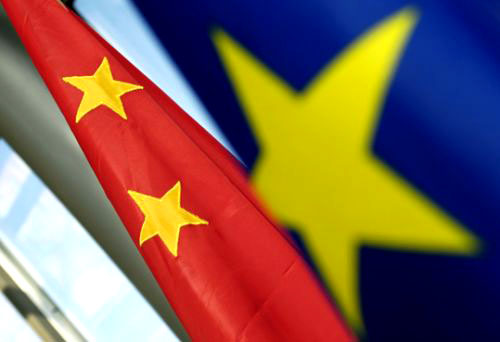Trade, investment key to China-European relations
- By Tim Collard
 0 Comment(s)
0 Comment(s) Print
Print E-mail China.org.cn, November 6, 2012
E-mail China.org.cn, November 6, 2012

To everyone's relief, relations between China and European Union member states have improved considerably over the last twenty years. Across the board, confrontation has been replaced by mutually respectful dialogue, and political suspicion muted by mutually beneficial economic cooperation. Last week Chinese Vice Foreign Minister Song Tao published an article in Britain's Daily Telegraph, re-stating China's commitment to good relations with Europe. Vice Minister Song's article was unequivocally friendly in tone, and we Europeans are genuinely pleased to have China as a friend and strategic partner.
The question remains, however, "What is Europe"? China's policy is always to take international entities at their face value, and not to ask questions about legitimacy or about who is really in charge. Not that there is anything illegitimate about EU institutions; but the issue of who is really in charge is quite important, especially in the case of a strategic partner – a strategic partnership between China and the EU has been in place since 2003.
The question Henry Kissinger asked – "If I want to speak to Europe, whom do I call?" is still relevant today. Officially, of course, it's the President of the European Council, Herman van Rompuy, or the High Representative for Foreign Affairs, Catherine Ashton. (Who? I hear you ask.) But the Chinese know as well as anybody else that that isn't the answer; you call the German Chancellor, the French President or the British Prime Minister, as you always have done. True, those three will say three different things, but they're still the only ones with anything to say at all.
Vice Minister Song made it clear that "China is a staunch supporter of European integration". This is welcome; but it is not a view shared by all Europeans. Not that anyone wants to return to conflict in Europe; but there is considerable doubt as to whether the structures of the EU, particularly the single currency, are really adequate to cope with such strain and stress as the European economies are bearing at the moment.
Germany, the country by far the most strongly committed to the European project, has to take more control and exercise more influence than anyone is comfortable with, either the smaller, stricken countries like Greece, or the German taxpayers who are funding the bail-outs. And it is no secret that French and British interests diverge on a whole range of issues, both economic and political.
Fortunately, these problems do little practical harm to the Europe-China relationship, as the basis of the partnership does not consist in declarations or top-level summits, but on trade and investment going on at the grass roots. For thirty years there has been a very productive flow of European investment into China, which has greatly aided both countries, and will continue to do so in the future. Now that the tables have turned, in that China has money and Europe badly needs a kick-start, we hope to see a strong growth in Chinese investment into Europe. (If I may advertise for my own country, Britain is keen to take a lead in providing the best possible platform for attracting direct investment; the British Chamber of Commerce is running a major seminar on investment in Europe in Shanghai this week.)
Of course there was another dimension to Vice Minister Song's article – a political one. He appealed to the common experience of China and Europe in the twentieth century, in which we all fought together to defeat an attempt by Germany and Japan to subject both Europe and Asia to an inhumane tyranny. China is anxious to acquire European diplomatic support in the dispute with Japan over the Diaoyu Islands, which the Vice Minister mentioned no less than six times in his article. As I made clear in my last article on this site, I am broadly sympathetic to the Chinese view, for exactly the reasons Vice Minister Song sets out. But the chances of putting together a unified European view on this issue are very small. Most Europeans are scarcely aware of the issue, and certainly unaware of its significance. And reaching a joint EU position on any political issue is virtually impossible, as European countries are competitors rather than partners, and, on this issue, are all vulnerable to Japanese pressure.
The answer to this? Once again, it is trade and investment. For years the Japanese have had an excellent opportunity to present their case, by means of a strong commercial presence in Europe, involving an extensive programme of investments. If China follows that example, Europeans – and not only diplomats and journalists – will be much more exposed to Chinese views and positions. Chinese, don't leave it all to your Vice Foreign Minister – come over here, invest for profit and make your country's case!
The author is a columnist with China.org.cn. For more information please visit: http://www.china.org.cn/opinion/timcollard.htm
Opinion articles reflect the views of their authors, not necessarily those of China.org.cn.







Go to Forum >>0 Comment(s)